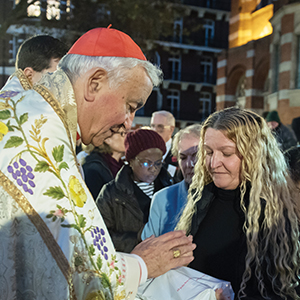Britain must guard against human rights abuses by British companies operating overseas as it renegotiates its trade deals following its decision to leave the European Union, Cafod has warned.
In a report published on Tuesday, the aid agency questions whether Britain is doing enough to protect the world’s poorest people from harm caused by British businesses operating in other countries. The intervention comes as the Government looks to forge new trading partnerships with countries outside the EU, including many in the developing world. Last week, Prime Minister Theresa May was in India on a trade mission.
Cafod says that if Mrs May is to commit to tackling irresponsible business practices, she must revisit the UN’s Guiding Principles on Business and Human Rights. The Government promised to deliver the principles five years ago, but since then its performance has been patchy, according to the report which was released on 15 November at the United Nations Forum on Business and Human Rights in Geneva. It says that strong progress has been made in areas such as modern slavery but that there have been decisions that have undermined Britain’s leadership role – for example by changing the law to make it harder for victims of British companies’ actions abroad to bring legal cases against them in Britain.
“The UK was the first country to commit to ensuring businesses respect human rights – now it needs to deliver on its promises. The country needs new trade deals, but it’s imperative the UK doesn’t promote its own business interests to the detriment of the world’s poorest people,” said the report’s author, Anne Lindsay, lead private sector analyst at Cafod.
The report questions whether British companies are doing enough to prevent human rights abuses occurring in the wholly owned subsidiaries of businesses based in the UK.
A British-owned mine, Tintaya, in southern Peru, is cited as an example. The mine, owned by Glencore since 2011, which has offices registered in London, reportedly drains local water resources, and, it is claimed, has not been of financial benefit to the local community – 65 per cent of whom are living in poverty. The report shows how the local community has been unable to raise their concerns with the operations of a UK business with a subsidiary abroad.
An investigation by the BBC’s Panorama last month found that refugee children were working in a factory in Turkey making clothes for Marks and Spencer. The children were earning about £1 an hour – far below the Turkish minimum wage – and paid in cash on the street by a middleman.
Marks and Spencer said its inspections have not found a single Syrian refugee working in its supply chain in Turkey but called the findings “extremely serious” and “unacceptable”.
17 November 2016, The Tablet
Cafod fears poor could be exploited in new trade deals
 Loading ...
Loading ...
Get Instant Access
Subscribe to The Tablet for just £7.99
Subscribe today to take advantage of our introductory offers and enjoy 30 days' access for just £7.99

